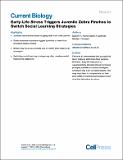Early-life stress triggers juvenile Zebra finches to switch social learning strategies
Abstract
Stress during early life can cause disease and cognitive impairment in humans and non-humans alike [1]. However, stress and other environmental factors can also program developmental pathways [2, 3]. We investigate whether differential exposure to developmental stress can drive divergent social learning strategies [4, 5] between siblings. In many species, juveniles acquire essential foraging skills by copying others: they can copy peers (horizontal social learning), learn from their parents (vertical social learning) or from other adults (oblique social learning) [6]. However, whether juveniles' learning strategies are condition-dependent largely remains a mystery. We found that juvenile zebra finches living in flocks socially learnt novel foraging skills exclusively from adults. By experimentally manipulating developmental stress we further show that social learning targets are phenotypically plastic. While control juveniles learnt foraging skills from their parents, their siblings, exposed as nestlings to experimentally elevated stress hormone levels, learnt exclusively from unrelated adults. Thus, early-life conditions triggered individuals to switch strategies from vertical to oblique social learning. This switch could arise from stress-induced differences in developmental rate, cognitive and physical state, or the use of stress as an environmental cue. Acquiring alternative social learning strategies may impact juveniles' fit to their environment and ultimately change their developmental trajectories.
Citation
Farine , D R , Spencer , K A & Boogert , N J 2015 , ' Early-life stress triggers juvenile Zebra finches to switch social learning strategies ' , Current Biology , vol. 25 , no. 16 , pp. 2184-2188 . https://doi.org/10.1016/j.cub.2015.06.071
Publication
Current Biology
Status
Peer reviewed
ISSN
0960-9822Type
Journal article
Description
D.R.F. was funded by grants from NSF (NSF-IOS1250895) to Margaret Crofoot and BBSRC (BB/L006081/1) to Ben Sheldon, K.A.S. was funded by a BBSRC David Phillips Research Fellowship, and N.J.B. was funded by a Netherlands Organisation for Scientific Research (NWO) Rubicon grant.Collections
Items in the St Andrews Research Repository are protected by copyright, with all rights reserved, unless otherwise indicated.

